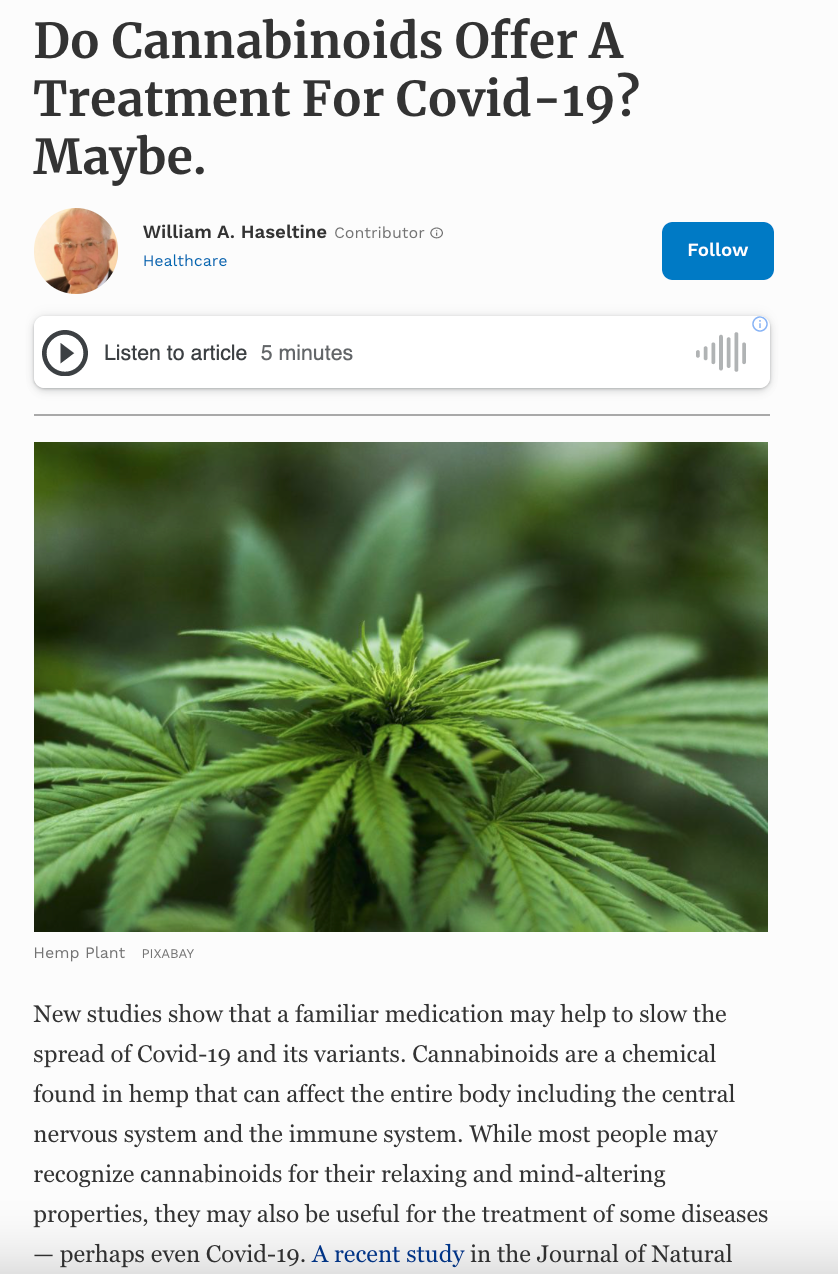New studies show that a familiar medication may help to slow the spread of Covid-19 and its variants. Cannabinoids are a chemical found in hemp that can affect the entire body including the central nervous system and the immune system. While most people may recognize cannabinoids for their relaxing and mind-altering properties, they may also be useful for the treatment of some diseases— perhaps even Covid-19. A recent study in the Journal of Natural Products along with a preprinted study from Cold Spring Harbor Laboratory, suggest several potential areas in which cannabinoid molecules may play a role in treating SARS-CoV-2 infections.
Hemp, including the hemp flower marijuana, contains a wide variety of cannabinoids. The most well-known of these cannabinoids are tetrahydrocannabinol (THC) and cannabidiol (CBD). CBD has recently been approved for the treatment of severe epilepsy in children but is also widely available in commercial natural products. In addition to these two compounds, there are dozens of minor components that may have medical applications as well.
One of the compounds that has been studied by two different research groups is CBD. The first paper explores the role of a CBD precursor in the interaction between the SARS-CoV-2 spike protein and ACE2 receptors found in human epithelial cells.

Surprisingly, when examining the structure of a precursor to CBD called CBDA, along with a precursor to another compound called cannabigerol (CBGA), scientists found that both CBDA and CBGA contained physical properties that allowed them to bind to the SARS-CoV-2 spike protein. When CBDA and CBGA were introduced to a system containing healthy cells and the virus, the cannabinoids competed with the epithelial cells to bind with the spike protein, effectively blocking SARS-CoV-2 from infecting the cells. While the study found that both compounds were able to combat SARS-CoV-2 infections, a very high dosage was required for them to be effective. This suggests that while CBDA and CBGA may not be ideal molecules to treat SARS-CoV-2, there may be variants of the compounds that have a much tighter affinity to the spike protein and would require a smaller dosage, which is worth exploring.
The second study provides an entirely different mechanism for the potential action of CBD against SARS-CoV-2 through a response called apoptosis. Apoptosis is a natural consequence of infections and occurs when an infected cell self-destructs to prevent the virus from replicating and spreading to other healthy cells. This occurs without causing an inflammatory reaction, making it a fairly innocuous process with limited side effects. It is one of the fundamental aspects of our body’s natural immunity and apparently, may be potentiated by CBD.
Fernandes et al. found that when infected cells were exposed to CBD the cells engaged in apoptosis at a significantly higher frequency than their control counterparts. This indicates that in the presence of CBD, our cells’ innate immune systems are much more effective at defending against SARS-CoV-2 which could lead to a much milder or completely absent course of illness. In this case, significant results occurred in the presence of a much lower concentration of CBD.
These two studies are promising. However, they do not suggest that patients should seek over-the-counter CBD products or recreational marijuana as a defense against Covid-19. While companies have already begun using studies like these to promote their CBD products, no clinical trials have been conducted to suggest that these compounds would be effective against Covid-19 in humans. Not to mention, separate studies have found that the presence of THC – a common compound found in marijuana products— actually counteracted any benefits of CBD found in the studies.
Overall, though these studies do not suggest an immediate application of CBD for the treatment of Covid-19, they do open the door to a very interesting new area of research for anti-SARS-CoV-2 drugs. This could include drugs that have a higher affinity for the SARS-CoV-2 spike protein, or research on a variety of cannabinoids that may strengthen the body’s ability to combat the virus.


